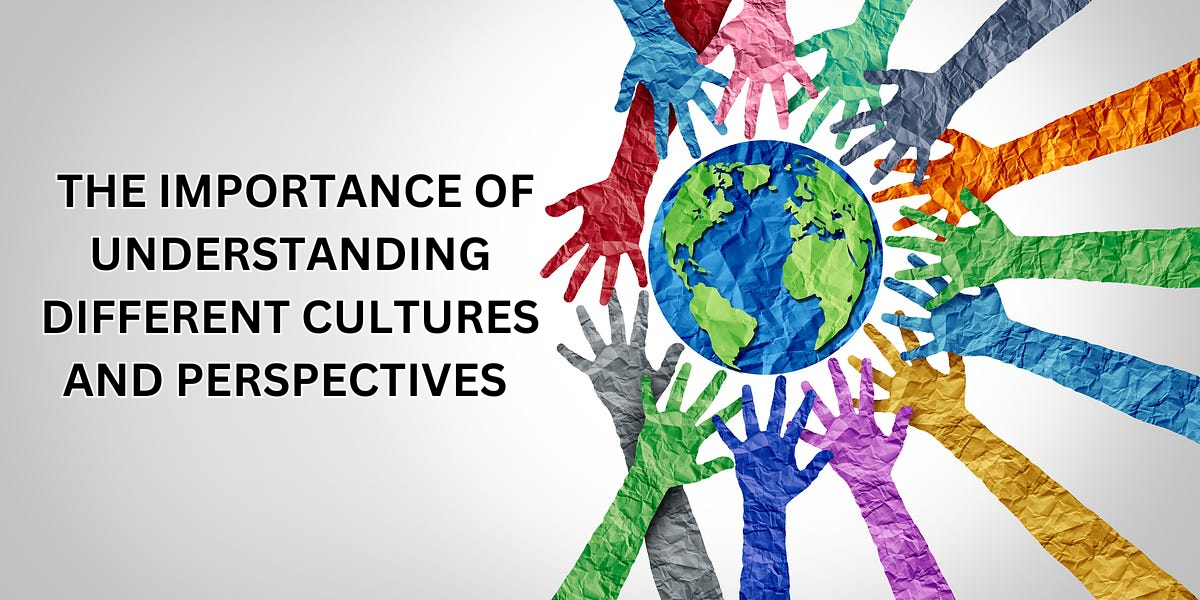In today globalized world understanding different cultures and perspectives is more important than ever as people from diverse backgrounds work and live together having the ability to appreciate and respect cultural differences can foster better communication stronger relationships and a more inclusive environment each culture brings unique values traditions and ways of thinking that can offer fresh insights and innovative solutions by learning about and embracing these differences we can break down stereotypes reduce misunderstandings and create a more harmonious society understanding various perspectives also encourages empathy allowing us to see the world from other people points.
Which can lead to greater tolerance and cooperation in the workplace in communities or on a global scale being culturally aware helps us connect with others in meaningful ways and avoid conflicts that might arise from ignorance or assumptions having a broader understanding of the world helps individuals grow personally broadens their worldview and makes them more adaptable in an ever-changing world in a world that increasingly interconnected the importance of understanding different cultures and perspectives is essential for building respect collaboration and peace across borders.
Benefits of Cultural Understanding:
Cultural understanding brings a wide range of benefits that can enrich both personal and professional lives one of the main advantages is the ability to communicate more effectively with people from different backgrounds when you understand and respect cultural differences you can avoid misunderstandings and engage in more meaningful conversations this leads to stronger relationships whether in the workplace in social settings or while traveling in the workplace cultural understanding can boost teamwork and collaboration by helping people with diverse perspectives work together harmoniously.
It also helps in problem-solving as different cultural viewpoints can bring innovative ideas and creative solutions cultural understanding fosters empathy and tolerance enabling individuals to see the world through others eyes which promotes inclusivity and reduces prejudice on a personal level learning about other cultures can broaden your horizons increase your awareness of global issues and help you become more open-minded it can also make you more adaptable as understanding different ways of thinking and living helps you navigate various situations with ease.
Power Dynamics and Privilege:
Power dynamics and privilege are concepts that explore how power and advantages are distributed among different groups in society power dynamics refer to the way power is shared controlled and exercised between individuals or groups often influencing relationships decisions and opportunities these dynamics can be seen in various contexts such as workplaces communities and governments privilege on the other hand refers to the unearned advantages or benefits certain individuals or groups have simply because of characteristics like race gender socioeconomic status or background people with privilege may have more access to resources opportunities or rights that others do not often without realizing it.
A person from a wealthier background might have easier access to higher education or job opportunities while someone from a marginalized group might face barriers to those same opportunities understanding power dynamics and privilege is important because it helps us recognize inequality and the ways in which certain groups are systematically disadvantaged it also encourages self-awareness empathy and the desire to create more equal fair and inclusive environments by acknowledging these issues individuals and communities can work towards addressing social injustices and creating a society where everyone has an equal chance to succeed.
Practicing Empathy and Active Listening:
Practicing empathy and active listening are powerful ways to build stronger more meaningful connections with others empathy involves understanding and sharing another person feelings or experiences which helps us connect on a deeper level when we practice empathy we are able to put ourselves in someone else shoes they sharing their struggles or celebrating a success active listening on the other hand is the skill of truly paying attention to what someone is saying without interrupting judging or thinking about how we respond it means focusing entirely on the speaker asking clarifying questions.
When we combine empathy with active listening we not only hear words but also understand the emotions and intentions behind them this makes people feel valued respected and supported practicing these skills can improve communication reduce misunderstandings and help resolve conflicts more effectively in personal relationships or professional settings empathy and active listening create a safe and open environment where people feel heard and understood by making a conscious effort to practice these skills.
Cultural Complexity and Nuance:
Cultural complexity and nuance refer to the many layers and subtleties that make up different cultures which often go beyond simple stereotypes or generalizations every culture has its own set of values traditions customs and beliefs that shape how people think behave and interact with others these elements are influenced by history geography religion and social structures creating unique perspectives on topics like family work and community understanding cultural complexity means recognizing that each culture is multifaceted and constantly evolving it important to appreciate that within any culture.
There are different viewpoints experiences and practices that may not always align with what we expect or are familiar with nuance refers to the small but significant details that contribute to these differences such as the tone of communication body language or the importance of hierarchy in relationships by acknowledging cultural complexity and nuance we can avoid oversimplifying or misjudging others and instead approach them with respect and curiosity this deeper understanding allows for more meaningful interactions reduces cultural misunderstandings and fosters empathy
